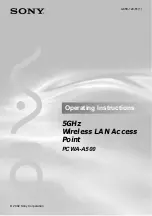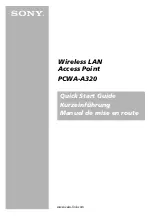
During EAP authentication, the 802.11a+g Router relays authentication messages between the
RADIUS server and clients being authenticated.
802.1x allows users to leverage a RADIUS server to do association authentications. You can also
enable dynamic WEP keys (64, 128, 152-bit) to have data encryption. Then you do not have to enter
the WEP key manually because it will be generated automatically and dynamically.
Note: After you have finished the configuration wizard, you have to configure the Radius Settings in
Advanced Settings in order to make the 802.1x function work.
WPA-PSK
Wi-Fi Protected Access (WPA) with Pre-Shared Key (PSK) provides better security than WEP keys. It
does not require a RADIUS server in order to provide association authentication, but you do have to
enter a shared key for the authentication purpose. The encryption key is generated automatically and
dynamically.
Pre-shared Key: This is an ASCII string with 8 to 63 characters. Please make sure that the 802.11a+g
Router and the wireless client stations use the same key.
Encryption Type: There are two encryption types TKIP and CCMP (AES). While CCMP provides
better security than TKIP, some wireless client stations may not be equipped with the hardware to
support it. You can select Both to allow TKIP clients and CCMP clients to connect to the Access
Point at the same time.
Group Rekey Interval: A group key is used for multicast/broadcast data, and the rekey interval is
time period that the system will change the group key periodically. The shorter the interval is, the better
the security is. 60 seconds is a reasonable time, and it is used by default.
WPA
Wi-Fi Protected Access (WPA) requires a RADIUS server available in order to do authentication (same
as 802.1x), thus there is no shared key required.
The Encryption Type and Group Rekey Interval settings are same as WPA-PSK.
24
















































